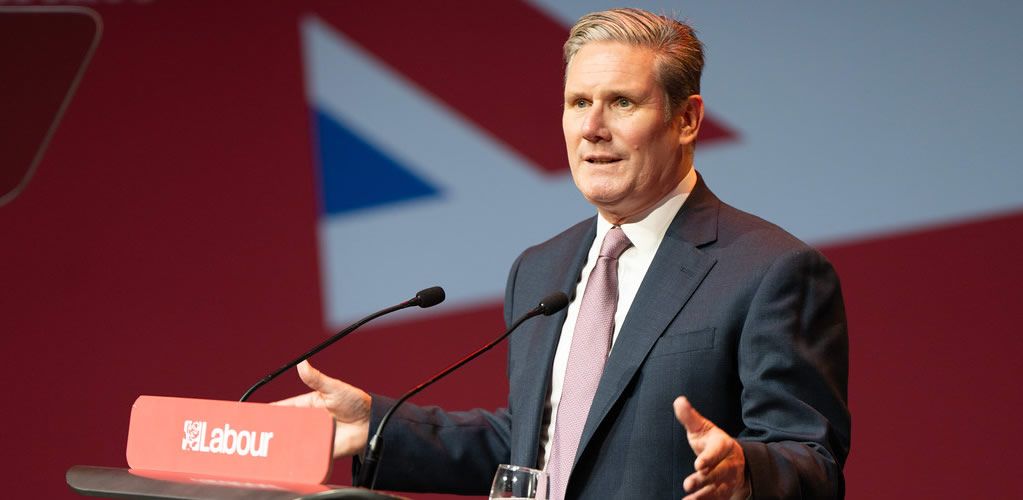Labour’s immigration policy: Will focus on ‘security’ win an election?
Labour’s immigration policy emphasises border security and targeting smuggling gangs, aiming to win back “red wall” voters concerned about immigration. Labour’s strategy can talk tough on security while not demonising migrants themselves, offering a nuanced position.

Labour’s immigration policy emphasises border security and targeting smuggling gangs, aiming to win back “red wall” voters concerned about immigration. Labour’s strategy can talk tough on security while not demonising migrants themselves, offering a nuanced position.
L abour’s immigration policy is starting to take shape. Migration, historically, has been a tricky issue for the party. So it’s perhaps not surprising that they are taking a leaf from the Conservative playbook by focusing on border security. But Labour has shifted the villains from asylum seekers to smuggling gangs.
Speaking at Labour Party conference, the shadow home secretary, Yvette Cooper, announced a new cross-border unit of hundreds of police officers to go after smugglers. Labour leader Keir Starmer has vowed to “smash the gangs”, to treat people smuggling on par with terrorism and to use serious crime orders to freeze smugglers’ assets and restrict their movement.
Starmer and Cooper also recently travelled to The Hague for talks with Europol (the EU’s law enforcement agency) about sharing criminal data – something that ended after Brexit. And noises have been made about cooperating with Europe on a returns agreement, where the UK would accept a quota of asylum seekers who arrive in the EU, in exchange for being able to return people who cross the channel.
While not the inflammatory comments of the current home secretary, Suella Braverman, Labour’s rhetoric so far still squarely frames asylum as a security issue. This is not the progressive approach some on the left will be hoping for. It feeds into the populist idea that migration is always a crisis, and has an element of inhumanity and utilitarianism – migrants are people, not trade agreements.
But given the public’s current attitudes on migration (nuanced) and trust in the Conservatives on the issue (low), it’s an electorally safe approach.
The suggestion of working with Europe, which gives the Conservatives ammunition to frame Labour as wanting to rejoin the EU, isn’t much of a risk. Brexit and the topic of Europe are arguably less divisive than in the last election.
Who is this approach for?
The focus on security is a bid to win back key “red wall” voters who fled to the Conservatives in 2019 and care slightly more about immigration than other groups. This is evident in Starmer’s recent statement that those who oppose his proposals on migration are “unBritish” – a dog-whistle to precisely these “patriotic left” voters.
But the characterisation of red wall voters as simply anti-migrant isn’t accurate. While migration is a priority, it still sits behind more pressing concerns like the cost of living crisis. Focusing too much, or taking too hard a line on immigration won’t win them voters and could lose some younger left-wing voters who favour increased immigration.
To that end, Starmer has also confirmed that Labour would overturn the new law that stops cross-Channel migrants claiming asylum in Britain, scrap the policy to deport people to Rwanda and end the use of barges and hotels to house asylum seekers.
These are all positive developments for those wanting a more progressive policy, and would at least fracture the current system, which is inhumane and unworkable.
Public attitudes on immigration have shifted dramatically in the last decade. On the whole, evidence suggests that attitudes have softened and the UK public now has among the most positive attitudes towards immigration internationally.
At the same time, the public overestimates both the number of asylum seekers as a proportion of immigration and the number of migrants overall. Focusing heavily on asylum seekers or net migration targets will only feed into these misconceptions.
One area where we haven’t heard much from Labour is on labour migration, arguably the more pressing issue in terms of Britain’s economic security. Starmer suggested last autumn that future policy would involve trade unions. If Labour gets the balance right they could craft a more progressive policy that treats migrants respectfully while also gaining support from unions and a disgruntled business sector.
Will this strategy work?
The public already trusts Labour more on immigration and has little faith in the current government to deliver on their promises.
Targeting criminal gangs as the security threat on the border might be electorally rational. Labour can talk tough to appease the voters it needs to win back, while keeping with a more ideologically coherent position that doesn’t paint migrants themselves as a problem. As we know from the reaction to Ed Miliband’s “Controls on immigration” mug in 2015, anti-migrant sentiment does not play well for Labour.
As the election nears, Braverman is going to keep talking about asylum seekers, which will ramp the issue up the agenda. But this is a distraction from her own party’s failures on the issue – and more a bid for party leadership than a stance as home secretary.
The general public’s attitudes on migration are more nuanced than Braverman’s rhetoric would suggest. Labour’s security focus might make electoral sense, but it still pulls from old playbooks, both Labour and Conservative.
Starmer could take this opportunity to tell a more positive story about immigration, carve a clear progressive position for Labour and move the discussion away from numbers – a strategy that will never deliver.

Sources:
▪ Text: This piece was originally published in The Conversation and re-published in PMP Magazine on 11 October 2023. | The author writes in a personal capacity.
▪ Cover: Flickr/Keir Starmer. (Licensed under a Creative Commons Attribution-ShareAlike 4.0 International License.)







[Read our Comments Guidelines]